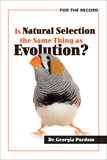
New Study Overturns the “Conventional Wisdom” of Evolution
Conventional evolutionary wisdom has been overturned—again.
Evolutionists have long taught and believed that promiscuity increases genetic and rapid diversity, thereby helping the evolution of new species along. But this “conventional wisdom” has now been overturned by a new study on shorebird populations, led by the University of Bath’s Milner Centre for Evolution.
Polygamy vs. Monogamy
This new study suggests that promiscuity does the opposite of what has long been believed. Instead of speeding up supposed evolutionary processes, it slows down the formation of new species. Polygamous bird species (species that breed with more than one partner during the season) have less genetic diversity compared to monogamous bird species populations (species that breed with just one partner per season).
Here’s why:
- Polygamous species have to travel farther to find their mates, so they spread their genes over a wide geographical area. This mixes up and dilutes the gene pool over a larger area so that populations are “less likely to diversify into new species over time.”
- Monogamous species generally come back to the same breeding sites, which allows them to gradually adapt to that specific environment. This increases the chance they will split off and form new species.
Evolution or Natural Selection?
Now, this article throws the word evolution around a lot, but is it really evolution? In this article, they define evolution as
Darwin's theory of evolution showed that new species evolve when natural selection favours individuals with particular characteristics, allowing them to survive, breed and pass on their genes more successfully than their peers. Over time, a group of individuals can evolve to adapt to their local environment and form a new species.
But really all they’re talking about is natural selection and adaptation, which is not the same thing as evolution. Evolution requires the addition of brand-new information to change one kind of organism into another kind. But what we observe in nature—including what they observed in this study—is speciation caused by natural selection and adaptation.
New species (which are simply variations within a kind that possess specific characteristics reflecting their genetics) form because some individuals survive better than others in a specific environment due to the features they express (i.e. longer beak or larger wingspan). Those with these characteristics live and pass along their genes; those without it are less likely to reproduce, and may even die. This is an observable process we see going on around us, and it does indeed form new species.
While we can observe the formation of new species due to the incredible amount of genetic variability God has built into each creature’s genome, what we never observe is one kind of organism turning into another kind. This is not based on observational evidence but is an interpretation of speciation.
Genetic Diversity and the Flood
Could this research help explain the explosion of genetic diversity that followed the global Flood of Noah’s day? Perhaps it could. Animals getting off the Ark couldn’t really be promiscuous—most of them only had one mate to choose from! Perhaps this forced monogamy helped to kick start genetic diversity in the first few generations after the Flood.
In addition, these Ark kinds had a greater genetic diversity than the animals we have today: they have speciated out (e.g. lost genetic information) for more than 4,300 years. The Ark kinds also were faced with conditions that tend to promote speciation—extensive climactic, dietary, and later predator/prey changes; genetic bottlenecks; founder effect; and then geographic isolation as they spread around the globe. When all of these early-post-Flood and Ice Age factors are considered alongside “forced monogamy” or “reduced promiscuity” of many animal kinds at this time, the early splits and linear speciation we see in the Tertiary fossil record make perfect sense within an early-post-Flood and Ice Age biblical timeframe.
Recommended Resources

Answers in Genesis is an apologetics ministry, dedicated to helping Christians defend their faith and proclaim the good news of Jesus Christ.
- Customer Service 800.778.3390
- © 2024 Answers in Genesis






